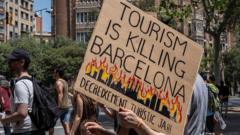A significant power failure caused chaos throughout Spain and Portugal, but a coordinated effort led to a methodical restoration of services, highlighting vulnerabilities in the country's energy infrastructure.**
Spain's Swift Recovery Following Historic Power Outage**

Spain's Swift Recovery Following Historic Power Outage**
After a nearly 23-hour blackout, Spain's power grid gradually restored electricity, raising questions on future prevention and the reliance on renewable energy sources.**
Spain has begun to return to normalcy following an unprecedented nationwide blackout that lasted nearly 23 hours. As life resumes in both Spain and Portugal, scrutiny turns to how such a critical failure occurred and whether measures can be implemented to prevent repetition. The blackout unfolded on Monday, with the electricity grid officially declaring a return to normalcy at 11:15 AM local time (09:15 GMT) on Tuesday.
On the day of the outage, chaos ensued across the nation. The crisis began due to two simultaneous connectivity issues in southwestern Spain, compounded by a disconnection from the French electricity network. Prime Minister Pedro Sánchez disclosed that at 12:33 PM on Monday, the grid suffered a sudden loss of 15 gigawatts of electricity, equating to around 60% of the country's power capacity vanishing almost instantaneously. Fortunately, the Canary Islands, Balearics, along with Ceuta and Melilla on the North African coastline, remained unaffected.
Critics have pointed fingers at the saturation of solar energy that the grid relied on, as Spain was operating at 60.64% solar photovoltaic generation just before the failure. Eduardo Prieto, the operational director for the grid's operator, Red Eléctrica, indicated that the situation was stable until the sudden drop in power generation.
Restoration efforts were immediate and meticulous, focusing on reintegrating power from both northern and southern energy generation sectors while avoiding potential overloads. This so-called "black start" involved significant coordination, leveraging hydro-electric plants as the primary source for rapidly producing electricity from full reservoirs while also activating combined-cycle gas plants. However, nuclear plants in Almaraz, Ascó, and Vandellós had to shut down automatically during the incident.
Neighboring countries also lent a hand; Morocco transferred 900MW of power to Spain through existing high-voltage connections, while France increased its electricity supply via the line to Catalonia, ultimately restoring 700MW and later scaling up to 2,000MW.
By late Monday, power was gradually returning, with electricity provider Endesa reporting nearly 3.5 million customers reconnected by 7:15 PM. The grid operator noted around 35.1% of demand was restored by then, escalating to over 99% by Tuesday morning. Yet, the cost of the blackout is already estimated at €1.6 billion, with criticisms emerging about the government's response speed.
Despite the turmoil, the resilience shown by the Spanish people received commendations, with hospitals operating on backup generators and police aiding stranded travelers. Emergency shelters were activated, demonstrating community support in times of crisis. Amid the disruption, calls for blood donations surfaced as the nation approached a public holiday weekend.
Moving forward, Pedro Sánchez committed to learning from this ordeal, though experts warn that the existing energy infrastructure may not fully accommodate the expansion of renewable sources. Recent warnings regarding the potential risks of an over-reliance on renewables were echoed, raising concerns that without reform, a similar crisis could strike again.
On the day of the outage, chaos ensued across the nation. The crisis began due to two simultaneous connectivity issues in southwestern Spain, compounded by a disconnection from the French electricity network. Prime Minister Pedro Sánchez disclosed that at 12:33 PM on Monday, the grid suffered a sudden loss of 15 gigawatts of electricity, equating to around 60% of the country's power capacity vanishing almost instantaneously. Fortunately, the Canary Islands, Balearics, along with Ceuta and Melilla on the North African coastline, remained unaffected.
Critics have pointed fingers at the saturation of solar energy that the grid relied on, as Spain was operating at 60.64% solar photovoltaic generation just before the failure. Eduardo Prieto, the operational director for the grid's operator, Red Eléctrica, indicated that the situation was stable until the sudden drop in power generation.
Restoration efforts were immediate and meticulous, focusing on reintegrating power from both northern and southern energy generation sectors while avoiding potential overloads. This so-called "black start" involved significant coordination, leveraging hydro-electric plants as the primary source for rapidly producing electricity from full reservoirs while also activating combined-cycle gas plants. However, nuclear plants in Almaraz, Ascó, and Vandellós had to shut down automatically during the incident.
Neighboring countries also lent a hand; Morocco transferred 900MW of power to Spain through existing high-voltage connections, while France increased its electricity supply via the line to Catalonia, ultimately restoring 700MW and later scaling up to 2,000MW.
By late Monday, power was gradually returning, with electricity provider Endesa reporting nearly 3.5 million customers reconnected by 7:15 PM. The grid operator noted around 35.1% of demand was restored by then, escalating to over 99% by Tuesday morning. Yet, the cost of the blackout is already estimated at €1.6 billion, with criticisms emerging about the government's response speed.
Despite the turmoil, the resilience shown by the Spanish people received commendations, with hospitals operating on backup generators and police aiding stranded travelers. Emergency shelters were activated, demonstrating community support in times of crisis. Amid the disruption, calls for blood donations surfaced as the nation approached a public holiday weekend.
Moving forward, Pedro Sánchez committed to learning from this ordeal, though experts warn that the existing energy infrastructure may not fully accommodate the expansion of renewable sources. Recent warnings regarding the potential risks of an over-reliance on renewables were echoed, raising concerns that without reform, a similar crisis could strike again.























